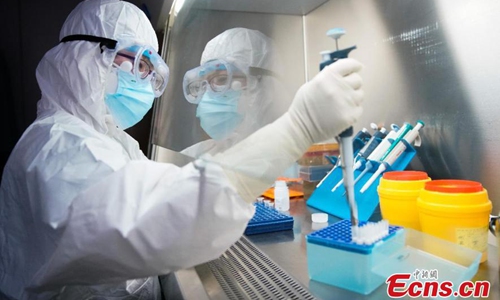HOME >> CHINA
COVID-19 of natural origin rather than lab creation: Chinese study
By Wang Qi Source:Global Times Published: 2020/3/8 19:38:40

Every nucleic acid testing involves a dozen steps taken within 6 hours, according to the director of the laboratory department of Shanxi Bethune Hospital in Taiyuan, capital of North China's Shanxi Province. Photo:China News Service
A Chinese-led research group announced in a study this weekend that their evidence suggested the coronavirus that caused the global COVID-19 outbreak likely occurred naturally and through gene recombination rather than being a laboratory creation.
The study published on bioRxiv, an open access preprint repository for the biological sciences, also indicated the virus might come from some natural recombination events among viruses in bats and other wildlife species.
The research and analysis came from 227 bat samples collected from Southwest China's Yunnan Province between May and October last year.
The bat-derived coronavirus RmYN02 shares about 93 percent similarity in gene sequence with its close relative HCoV-19, a novel coronavirus that causes the ongoing COVID-19 outbreak.
RmYN02 shows the insertion of multiple amino acids at two junction spots of the Spike (S) protein, once cited as evidence of laboratory creation of COVID-19.
The researchers said the newly detected virus provides strong evidence that such insertion events can occur in nature.
They said it also indicated that the COVID-19 virus might have emerged from multiple natural recombination events.
Yang Zhanqiu, a virologist at Wuhan University, told the Global Times on Sunday that natural recombination was a form of mutation common for viruses. "If the recombination has a high frequency, it means that the virus has various host animals," Yang said.
Previous studies have hypothesized bats, pangolins and other wildlife as possible hosts of the coronavirus, which mutated into the virus that finally infected human beings and caused the outbreak.
Bats are highly gregarious animals that stay in the same caves and rarely move long distances. This facilitates virus exchange between zooids and the occurrence of gene recombination, the study said.
The research team composes scientists from laboratories and institutes affiliated with the Chinese Academy of Sciences, as well as foreign experts at The University of Sydney. The paper has not yet been published or peer-reviewed.
Posted in: SOCIETY